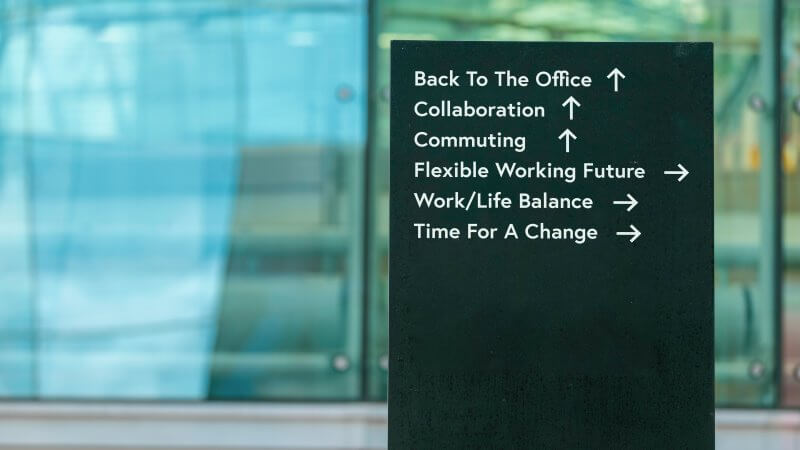Are you looking for an employer who truly understands the importance of work-life balance? Look no further. This article provides a curated list of the top flexible employers that have incorporated various work arrangements to accommodate their team’s needs. From remote-first companies to those pioneering hybrid models and flexible scheduling, learn which businesses are setting the bar high for workplace flexibility, and what their strategies could mean for your career.
Key Takeaways
- Flexible work arrangements, including remote, hybrid, and flexible scheduling, are being prioritized by businesses across various industries to improve employee work-life integration and overall satisfaction.
- Technology plays a critical role in enabling flexible schedules, with advancements in communication tools, project management platforms, and cloud-based services becoming instrumental in the success of remote and flexible work environments.
- The future of work is leaning towards a more flexible paradigm, driven by evolving employee expectations, technological advancements, and a continuous improvement mindset that aims to enhance productivity and work-life harmony.
Embracing Flexibility: Top Companies Prioritizing Work-Life Balance

The significance of a company that offers a healthy work-life balance is now universally acknowledged. Companies such as Nike, for instance, have strategically shifted their focus toward the evolving needs of their employees, fostering a culture that encourages a healthy balance for employees and their personal lives. Diverse sectors, particularly the SaaS and HR & Recruitment industries, are setting a precedent by prioritizing flexibility at their core. Smaller businesses such as Top Of The List and others with fewer than 300 employees, are also stepping up, pioneering flexible work policies that cater to the unique needs of their teams.
The Flexa100 report is an independently verified list ranking the top 100 most flexible companies. It serves as an authoritative guide on workplace flexibility and highlights businesses as trailblazers in employee flexibility.
Organizations highest on the report have seamlessly integrated flexibility into their organizational frameworks, offering a plethora of flexible working options that foster a healthy work-life harmony, thus setting a benchmark for others to follow as one of the world’s best examples.
Remote Work Champions
Remote work is a dominant form of flexible work arrangement, with certain corporations standing out as champions in this realm. Locum’s Nest, a health tech company, is one such remote-first organization that tops the Flexa100 report for 2023. With an office in Cyprus, the company has mastered the art of managing a remote team and fostering flexible hours. Similarly, Boldly has been a pioneer in the remote-first approach since 2012, offering enhanced paid parental leave and consistently ranking high in the Flexa100 report.
Other remote-first companies, including Boats Group and TELUS International, have not only embraced a remote workforce but have also demonstrated how to maintain productivity and employee satisfaction while doing so. They have successfully addressed business challenges and utilized technology to enhance communication, manage work schedules, and support a work-life blend, thereby setting a gold standard for other companies to emulate.
Hybrid Work Pioneers
While remote jobs offer undeniable advantages, some global companies have found a happy medium by pioneering hybrid work models. Microsoft, General Motors, Disney, and Chainalysis are among the top companies that have adopted a ‘hybrid-first’ model. This approach allows employees to choose their work site, location, and hours, thereby promoting workplace flexibility.
Corporations such as Microsoft and Google incorporate employee feedback in the design of their hybrid work models to ensure efficiency. This participative approach enables a workplace that minimizes stress and maximizes productivity. Similarly, Virgin Media O2 has extended its commitment to work-life design through hybrid work arrangements and enhanced parental and adoption leave policies. Companies that prioritize and support work-life balance and the ability to offer flexible hours or other working arrangements include:
Flexible Scheduling Innovators
Beyond working remotely and hybrid work, some companies have carved a niche for themselves as flexible scheduling innovators. Businesses like Lemon Tree Hotels, Legalite, and Delta Airlines are at the forefront, offering varying options from co-designed roles based on talents to job-sharing and part-time roles. These innovative measures cater to individual needs, offering employees the freedom to manage their work schedules in a way that best suits them.
Companies that prioritize and support work-life balance and the ability to offer flexible hours or other working arrangements include:
- Ulteig
- The Looma Project
- Buzzer
- Athenahealth
- PTC
- Mimecast
These technology company leaders are redefining the traditional workplace, creating a flexible culture that supports work-life integration and employee well-being.
The Benefits of Flexible Work Arrangements

The advantages of flexible work arrangements extend beyond the individual employee, benefiting the entire organization. For starters, they allow employees to work during their most productive hours, leading to increased productivity. Moreover, remote employees tend to work more days each year than office workers, thanks to fewer distractions and increased efficiency.
Offering flexibility in work schedules has several benefits for employees:
- It gives employees better control over their time, which improves their work-life fulfillment and satisfaction.
- Some employees are willing to take a pay cut for work flexibility, making it a highly valued perk.
- Higher employee retention rates can be achieved.
- Cost savings for businesses may be realized as less office space may be required.
- The talent market can expand by offering virtual work arrangements to individuals who previously could not apply due to physical location, or even a past felony record.
When it comes to the business bottom line, the benefits of flexible working arrangements are clear: improved performance, profitability, and employee engagement.
Employee Well-being
The positive influence of flexible hours and work arrangements on employee well-being is profound. Evidence suggests that such arrangements have small but beneficial effects on mental health, including:
- reducing symptoms of depression
- reducing psychological distress
- reducing burnout
- mitigating accumulated fatigue
Providing employees with work time control and the option to work from home can improve mental well-being and protect against mental health decline over time.
Businesses that prioritize their employees’ well-being have introduced initiatives like ‘wellness’ days off and ‘pawternity’ leave. As a result, a significant percentage of employees believe that flexible work options would enable them to lead healthier lives and feel less stressed. These initiatives, along with the recognition of the ‘human energy crisis’ among employees, are pushing the boundaries of what a healthy work-life flow can look like in the modern workplace.
Talent Attraction and Retention
In today’s competitive job market, organizations offering flexible working arrangements hold a distinct edge. They can attract talent from a broader geographic pool by removing geolocation constraints and adapting to global workforce needs. Companies developing a strong employer brand that highlights flexibility can more effectively recruit top talent in competitive job markets.
The availability of flexible work options is a key factor for employee retention, with a significant portion of employees seeking new jobs when current workplaces lack such opportunities. A prime example of this is Google, whose flexible work environment has contributed to attracting and retaining a highly motivated and productive workforce.
Business Adaptability
Within a rapidly changing business environment, a company’s adaptability is a key determinant of its success. Adopting flexible work arrangements is a strategic move that leads to:
- Enhanced engagement
- Enhanced performance
- Centering around human-centric values
- Long-term success
Companies that don’t permanently adopt flexible systems are likely to miss out on potential gains in sustainable productivity. The decision to implement hybrid work models factors in aspects of creativity, team culture, and personal development opportunities.
In the face of these changes, cloud computing provides scalable IT resources that enable a business to swiftly adapt their capabilities in response to varying workloads without substantial investments.
How Technology Enables Flexible Work

In this era of digital transformation, technology has emerged as an enabler of efficient remote and flexible work. Some essential tools for virtual work include:
- Project management tools like ClickUp
- Instant messaging platforms like Slack
- Conferencing services like Zoom
- File-sharing services like Google Drive
These tools are crucial for enabling effective remote working teams.
Successful remote work arrangements depend on employers providing the necessary tools and resources that empower employees to perform tasks efficiently outside the traditional office. Companies have been investing heavily in remote collaboration and communication technology, acknowledging the transformation of the workplace towards more flexible working environments.
Communication Tools
Communication tools have dramatically transformed team collaboration, particularly within remote or flexible work settings. Tools such as Microsoft Teams and Zoom are vital for remote work, empowering teams to collaborate in real-time regardless of their geographical locations.
The progress in communication and information technology, including the ubiquity of video conferencing and broadband internet, has been pivotal in the growth and success of remote work, reshaping company cultures and work styles. These tools provide necessary platforms for finding convenient meeting times and facilitating constant, effective communication.
Project Management Platforms
In addition to communication tools, project management platforms play a crucial role in enabling remote and flexible work. They allow teams to organize tasks, track progress, and manage resources efficiently.
The adoption of project management tools such as Clickup, Asana, Trello, and Basecamp is essential for maintaining team productivity and accountability when employees are not centrally located. These platforms provide an organized, centralized space where teams can collaborate, share updates, and track progress, making virtual work as efficient as possible.
Cloud-Based Services
Cloud-based services form the bedrock of remote and flexible work arrangements. Services like Google Workspace and Dropbox allow employees to access documents and applications from any location with an internet connection.
Companies like Outliant, Equip Behavioral Health, Trusted Health, CrowdStrike, and FluentU leverage cloud-based services to enable their remote workforces. These companies use various cloud-based platforms to maintain flexibility and meet the needs of their diverse teams working remotely from different locations.
The integration of such services demonstrates a company’s commitment to supporting work-life harmony options through flexible and virtual work options, making it a reliable company.
Tips for Job Seekers Looking for Flexible Employers

Given the soaring demand for flexible working arrangements, job seekers might face challenges in pinpointing companies that sincerely uphold work-life congruence programs. Here are a few tips to help navigate this search.
Use Keyword Filters to Find Flexible Work Job Postings
First and foremost, use job search engines and filters to look for keywords such as ‘remote’, ‘flexible’, ‘telecommute’, and ‘work from home’ to find jobs that offer the desired flexibility. Additionally, it’s essential to read through the job descriptions carefully and check the company’s career page to learn about their policies on flexible work schedules, telecommuting options, and benefits that support and create a work-life blend.
In interviews, don’t shy away from inquiring about benefits and the flexibility options that the company offers. Inquire as to how the company measures performance, and ask for a real-life example of how the company supports life balance.
Read Job Postings Closely
Adding a filter for “remote jobs” to find work-at-home positions doesn’t always mean you can work from anywhere. Closely read the post to find out if the company requires you to live in a location near the business or if it doesn’t matter.
There are many reasons why a company might require a work-at-home job to be near the workplace: Tax forms must be filed for each state, unemployment taxes are higher for the first few years in a new state, or there could be in-person meetings or appointment requirements.
Making assumptions can also be problematic. Perhaps you heard through word-of-mouth that a company offers remote employment. You found their ad online and spent the time to apply. After interviewing, you realized that the particular position you applied for required in-person work. Save yourself and the business time by thoroughly reading job postings.
Research Company Culture

A company’s culture, mirroring its values and practices, plays a pivotal role in its stance on work-life balance. Evaluating a company’s culture requires examining the beliefs and values of its leaders since they greatly influence the organization’s culture, goals, and behaviors.
Understanding a company’s approach to collaboration, team spirit, and recognition of success can provide important clues to its cultural environment. Investing time in learning about a company’s culture ensures that the job seeker’s expectations for work-life integration align with the employer’s, setting the foundation for clear mutual expectations.
Utilize Job Search Platforms
Identifying flexible job opportunities can be simplified by using the right job search platforms. Some platforms to consider are:
- FlexJobs: specializes in flexible job postings, with each job hand-screened for legitimacy
- Remote.co: offers curated lists of remote jobs across various industries
- Jobspresso: provides a curated list of remote jobs in tech, marketing, customer support, and more
- We Work Remotely: features remote job opportunities in programming, design, marketing, and more
- Virtual Vocations: offers a wide range of remote job listings in various industries
Access these platforms to help find the flexible job opportunities you’re looking for.
Platforms like AuthenticJobs and Guru also provide job listings and freelance opportunities that emphasize flexibility. Traditional job sites like Glassdoor, Monster, Indeed, and LinkedIn can also be utilized to customize searches to find flexible, part-time, and remote jobs.
Prepare for Interviews
The interview process is a crucial stage where candidates can learn more about a company’s approach to work-life flexibility. It’s essential that job seekers first determine their own definition of work-life integration, considering what aspects are essential and which ones they can be flexible about.
During interviews, asking direct questions about daily operations and expectations can reveal insights into whether the company’s interpretation of work-life integration aligns with the candidate’s personal standards. Before interviews, candidates should clearly identify their deal-breaker aspects of work-life harmony and those where compromise is possible.
The Future of Flexible Work

The future of flexible work is not a far-off idea, but an unfolding reality. Flexible work is evolving beyond just flexible working hours, to encompass choices in work location, time zones, when operations occur, and the methods by which work is conducted, including a flexible work schedule and flexible work hours.
Companies are anticipated to increasingly cater to a workforce that expects the option to work from any location around the world by bolstering their technological infrastructure to facilitate this worldwide flexibility. The future flexible work landscape is broadening to include:
- Remote options
- Flexible schedules
- Compressed workweeks
- Job sharing
These options are designed to meet diverse employee needs.
Evolving Employee Expectations
As work dynamics evolve, employee expectations follow suit. There’s a significant shift in employee expectations toward better work-life balance, and companies are starting to recognize this change. Leading companies like Microsoft are adapting their work environments to become more flexible, acknowledging the changing trend towards remote work as an enduring employee expectation.
This shift is not just limited to large corporations. Even companies like IBM, known for their consistency, have shown a long-standing commitment to meet evolving employee needs for work-life balance. This shows that the future of work is not set in stone but is continually evolving as flexible companies meet the changing needs and expectations of the workforce.
Technological Advancements
Technological advancements are facilitating more efficient, effective, and flexible working arrangements. From AI to cloud technologies, these innovations play a crucial role in enabling and sustaining flexible work models.
Artificial Intelligence (AI) will have different applications in various fields, significantly affecting work conditions in sectors with cognitive and analytical tasks. On the other hand, cloud technologies are integral for remote work, offering environmental benefits by optimizing energy usage in computing infrastructures.
Continuous Improvement
Looking towards the future of flexible work, the key lies in continuous improvement and adaptation. Organizations are encouraged to continually adapt and improve remote work policies to ensure success and meet the evolving expectations of the modern workforce. Focusing on measuring outcomes rather than processes is recommended for adapting to flexible work practices and for keeping employees accountable and engaged.
As we move forward, the goal is clear: create a work environment that supports a healthy work-life blend, fosters productivity, and accommodates the changing needs of the workforce.
Summary
Flexible working arrangements have transformed the corporate landscape, with numerous companies leading the way in prioritizing work-life balance. From remote work champions to hybrid work pioneers and flexible scheduling innovators, these companies have shown that flexibility is not just a trend, but a necessity in the modern work environment.
As we move towards the future, it’s clear that flexible working arrangements will continue to evolve, with technological advancements playing a key role. For applicants looking to find flexible employers, researching company culture, utilizing job search platforms, and preparing for interviews will prove to be beneficial. As the adage goes, “Change is the only constant,” and the world of work is no exception.
Frequently Asked Questions
What does it mean to be a flexible employer?
Being a flexible employer means embracing the idea that employees can be productive regardless of their location or work hours. It involves supporting better work-life integration, career and growth opportunities, and employee well-being.
Which company is the most flexible?
The most flexible company for work-life integration depends on the organization conducting the study and the specific flexibility factors that were explored. And none of the studies chose just one company.
According to Culture Monkey, fifteen companies made the list. The Muse chose twenty-five top companies as being the most flexible, and U.S. News chose ten top organizations.
What benefits do flexible working arrangements offer?
Flexible working arrangements offer increased productivity, improved employee well-being, higher retention rates, and adaptability to changing workforce needs, making them beneficial for both employees and businesses.
How does technology enable flexible work?
Technology enables flexible work by providing communication and project management platforms, as well as cloud-based services, which improve collaboration, organization, and accessibility for remote work.
How can job seekers find flexible employers?
Job seekers can find flexible employers by using job search engines, researching company culture, and asking about flexibility options during interviews. These steps can help identify companies that prioritize work-life balance.


